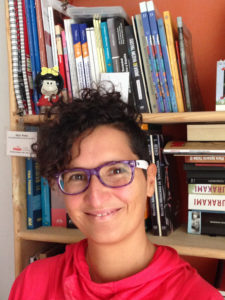ICNC 2017 Research Fellows
In 2017, the ICNC Research Fellows Program received a total of 36 applications from Ph.D. candidates and Junior Faculty and awarded 5 fellows. The 2017 Research Fellows work in Mexico City, New Jersey, North Carolina, London, and Manitoba. The goal of these fellows is to assist awardees in expanding their analytical and methodological focus, support empirical and field data collection, quantitative research, case based and network analysis, qualitative methods, as well as facilitate fieldwork and interviews with activists, practitioners and observers.
The 2017 Research Fellows:
Alice Poma
 Bio: Alice has a PhD in Social Science and Environment from the Pablo de Olavide University (UPO, Spain). She was a doctoral fellow of the Spanish español National Research Council (CSIC) at the School of Hispano-American Studies (EEHA), in Seville, a visiting student at the European University Institute (EUI) in Fiesole (Italy) and Newcastle University (UK), and a postdoctoral fellow at the UNAM-DGAPA Program for Post-Doctoral Scholarships, in Mexico City. She is a member of the Waterlat-Gobacit International Research Network and on the board of the International Sociological Association’s (ISA) working group on society and emotions. She has published several articles and chapters in Spanish español , English and Italian italiano on the role of emotions in protest, including her recent book: “Defendiendo tierra y dignidad. Emociones y cambio cultural en luchas contra represas en España y México” (UEPB, Brazil, 2017). At present she is a research associate at the UNAM Social Research Institute (IIS-UNAM) in Mexico City. Her main research interest is the emotional dimension of environmental civil resistances. She is studying this topic by analyzing the experience of people who take part in several self-organized grassroots groups and environmental conflicts. Her ICNC Mentor is Dr. Kurt Schock.
Bio: Alice has a PhD in Social Science and Environment from the Pablo de Olavide University (UPO, Spain). She was a doctoral fellow of the Spanish español National Research Council (CSIC) at the School of Hispano-American Studies (EEHA), in Seville, a visiting student at the European University Institute (EUI) in Fiesole (Italy) and Newcastle University (UK), and a postdoctoral fellow at the UNAM-DGAPA Program for Post-Doctoral Scholarships, in Mexico City. She is a member of the Waterlat-Gobacit International Research Network and on the board of the International Sociological Association’s (ISA) working group on society and emotions. She has published several articles and chapters in Spanish español , English and Italian italiano on the role of emotions in protest, including her recent book: “Defendiendo tierra y dignidad. Emociones y cambio cultural en luchas contra represas en España y México” (UEPB, Brazil, 2017). At present she is a research associate at the UNAM Social Research Institute (IIS-UNAM) in Mexico City. Her main research interest is the emotional dimension of environmental civil resistances. She is studying this topic by analyzing the experience of people who take part in several self-organized grassroots groups and environmental conflicts. Her ICNC Mentor is Dr. Kurt Schock.
Title: The Role of Emotions in Mexican Environmental Civil Resistance Movements.
Abstract: This research project aims to contribute to a better understanding of the cultural dimension of civil resistance movements by analyzing the correlation between emotions and civil resistance strategy/tactics employed in two Mexican urban environmental grassroots groups. By building a bridge between the literature on emotions and protest and civil resistance, this project aims to comprehend how emotions promote or hinder civil resistance. To achieve this goal, I will analyze 1) the correlation between the emotions felt by people and the tactics chosen, 2) the emotions generated by the tactics employed, and 3) the strategies of “emotion management” through which activists manage their emotions. The research techniques employed are interviews and focus groups with activists involved in two urban environmental civil resistances in Mexico, which are able to keep existing and choosing nonviolent strategies and tactics, despite receiving threats and harassment from police forces and criminal groups. The decision to work with members of two groups who defend territory in Mexico City and the Guadalajara Metropolitan Area can offer a comparative analysis centered on understanding the cultural processes linked to the choice to employ nonviolent strategies in a repressive context.
Anna Ikeda
 Bio: Anna is a PhD candidate at the Division of Global Affairs, Rutgers University, Newark, where her research interests include nonviolent social movements and how they intersect with issues such as national security and democratization. Her dissertation focuses on campaigns against U.S. military bases abroad and the transnational movement of various anti-base campaigns, examining them from a civil resistance perspective. Anna graduated from the Josef Korbel School of International Studies, University of Denver with MA in International Human Rights, and received her BA in Liberal Arts with a concentration in international studies from Soka University of America, graduating summa cum laude with honors. Her ICNC Mentor is Dr. Kathleen Gallagher Cunningham.
Bio: Anna is a PhD candidate at the Division of Global Affairs, Rutgers University, Newark, where her research interests include nonviolent social movements and how they intersect with issues such as national security and democratization. Her dissertation focuses on campaigns against U.S. military bases abroad and the transnational movement of various anti-base campaigns, examining them from a civil resistance perspective. Anna graduated from the Josef Korbel School of International Studies, University of Denver with MA in International Human Rights, and received her BA in Liberal Arts with a concentration in international studies from Soka University of America, graduating summa cum laude with honors. Her ICNC Mentor is Dr. Kathleen Gallagher Cunningham.
Title: Resistance against U.S. Military Bases: A Comparative Perspective
Abstract: How do we understand U.S. policies on its foreign military bases, and what roles do anti-military base campaigns play? Previous research on this topic has focused on conditions and structures that shape politics surrounding U.S. bases such as elite relations with the United States and domestic political transitions. By contrast, my research will focus on grassroots movements, methods of nonviolent action, and ties to global civil society through the transnational “No-Bases” network. I propose a movement-centered study with a specific focus on the civil resistance approach. In this research project, I will study campaigns against the U.S. military bases in the Asia-Pacific as well as Latin America and the Caribbean between 1999 and 2014. In doing so, I will examine what strategic and tactical factors explain the variations in outcomes of anti-U.S. military base campaigns between 1999 and 2014 and what was the impact of transnational social movement factors on such campaigns.
Howard Liu
 Bio: Howard is a Ph.D. candidate in the Political Science department at Duke University. His research interests lie in the intersection of political methodology and sub-national conflicts, with a focus on protest and repression studies. He uses machine-coded event data to analyze conflict dynamics and works on improving the quality of information retrieval from automated text data. His work also applies network analysis to the studies of interstate conflict behaviors. He is currently working on several projects using multiplex community detection methods and latent space modeling to analyze interstate conflict dynamics and improve forecasting performance. His ICNC Mentor is Dr. Kathleen Gallagher Cunningham.
Bio: Howard is a Ph.D. candidate in the Political Science department at Duke University. His research interests lie in the intersection of political methodology and sub-national conflicts, with a focus on protest and repression studies. He uses machine-coded event data to analyze conflict dynamics and works on improving the quality of information retrieval from automated text data. His work also applies network analysis to the studies of interstate conflict behaviors. He is currently working on several projects using multiplex community detection methods and latent space modeling to analyze interstate conflict dynamics and improve forecasting performance. His ICNC Mentor is Dr. Kathleen Gallagher Cunningham.
Title: Modeling Interdependence Between Repression and Dissident: A Network Perspective
Abstract: When studying state repression, scholars have recognized that repression affects protest behaviors and vice versa. This endogenous relation presents an empirical challenge for researchers to study and model this interdependent dynamic. While existing literature has explored various approaches, such as sequential models, vector auto-regression, and instrumental variable methods, to infer the sequential and causal relations, the task is still challenging. Strategic interaction also becomes more complicated when we consider the fact that there are often multiple tactics applied by both parties, which makes it even harder to tell which actions are responding to which tactics. To study this complex, this project adopts a network perspective to explore the interdependence among strategies. A tactic network on actions, rather than actors, allows us to not just cluster protest and repressive tactics by showing which tactics are likely to co-occur, but also reveals actors’ strategy preferences in contentious events. Using protest event data, this study empirically maps the strategy networks by latent space modeling and shows how it can improve our prediction of state repression on different types.
Leonie Fleischmann
 Bio: Leonie is a Lecturer in International Politics at City, University of London. She completed her PhD at City in 2015 and earned her MA in International Relations from King’s College London. Her research focuses on the Israeli-Palestinian conflict, with a particular interest in civil society activism against the occupation. Her PhD dissertation looked at the transformation of Israeli peace/anti-occupation activism through the lenses of social movement theory, arguing that contrary to conventional wisdom, this activism was not paralyzed by the outbreak of the second Palestinian Intifada, but took a new trajectory. Her work has been published in Peace and Change and Quest. She is also interested in the role of the human rights movement in conflict and peace building. She previously lived in Jerusalem, where she was a Visiting Research Fellow at the Hebrew עברית University of Jerusalem and has traveled extensively throughout Israel and Palestine. Her ICNC Mentor is Dr. Veronique Dudouet.
Bio: Leonie is a Lecturer in International Politics at City, University of London. She completed her PhD at City in 2015 and earned her MA in International Relations from King’s College London. Her research focuses on the Israeli-Palestinian conflict, with a particular interest in civil society activism against the occupation. Her PhD dissertation looked at the transformation of Israeli peace/anti-occupation activism through the lenses of social movement theory, arguing that contrary to conventional wisdom, this activism was not paralyzed by the outbreak of the second Palestinian Intifada, but took a new trajectory. Her work has been published in Peace and Change and Quest. She is also interested in the role of the human rights movement in conflict and peace building. She previously lived in Jerusalem, where she was a Visiting Research Fellow at the Hebrew עברית University of Jerusalem and has traveled extensively throughout Israel and Palestine. Her ICNC Mentor is Dr. Veronique Dudouet.
Title: Solidarity Activism: Israeli Anti-Occupation Campaigns
Abstract: The Israeli military occupation of the Palestinian Territories has reached its 50th anniversary, with no clear end in sight. Since the beginning of the occupation, Israeli and Palestinian activists have tried to challenge the prevailing realities through both normalized institutionalized channels and civil resistance campaigns. As of yet, these efforts have not achieved their ultimate goal of ending the occupation. However, daily resistance activities continue to be waged. Drawing from the literature on civil resistance, this article will analyse the various Israeli anti-occupation campaigns that have been waged in the past seventeen years, since the outbreak of the second Palestinian Intifada and the collapse of the political peace process. This study will focus specifically on the Israeli Jewish activists engaged in civil resistance campaigns against their own government, alongside and in solidarity with Palestinians activists. It will question whether civil resistance conducted by Israeli citizens is an effective form of political struggle to end the Israeli occupation of the Palestinians. In doing so, it will consider the role and influence of a privileged group of activists acting in solidarity of an oppressed group.
Masha Kardashevskaya
 Bio: Masha is a PhD Candidate at the Department of Peace and Conflict Studies, University of Manitoba. Her research interests are inspired by her passion and curiosity about social movements, nonviolent social change, and the often-neglected roles of women in these. Since graduating with her MA, she has worked in various parts of South-East Asia focusing on protection of human rights defenders, peace education, women’s and indigenous peoples’ issues using both advocacy and popular education approaches. These experiences led to the development of her PhD research project that is focused on the role of women in social movements, environmental and indigenous politics, and nonviolence. Her ICNC Mentor is Dr. Mary King.
Bio: Masha is a PhD Candidate at the Department of Peace and Conflict Studies, University of Manitoba. Her research interests are inspired by her passion and curiosity about social movements, nonviolent social change, and the often-neglected roles of women in these. Since graduating with her MA, she has worked in various parts of South-East Asia focusing on protection of human rights defenders, peace education, women’s and indigenous peoples’ issues using both advocacy and popular education approaches. These experiences led to the development of her PhD research project that is focused on the role of women in social movements, environmental and indigenous politics, and nonviolence. Her ICNC Mentor is Dr. Mary King.
Title: Peace, Social Movements, and Indigenous Women: Gendered Conceptualizations of Peace in Indonesia
Abstract: This research project proposes to look at challenges faced by the indigenous Toba Batak communities from North Sumatra, Indonesia in relation to their customary forest and land use changes as a result of an expansion of a pulp and paper plantation. The research aims to look at motivations of women who become involved in social movements, the various strategies and tactics they use, the gendered indigenous conceptualizations of peace and conflict, violence and non-violence, as well as the interactions between international, national, regional, and local social movements and the inclusion/exclusion of women’s voices in these movements. The findings of this research will be crucial for the expansion of our understanding of civil resistance and the development of our knowledge about peace and nonviolence. The research will give centrality to the indigenous peoples’, and, especially, the indigenous women’s worldviews through the use of indigenous, decolonizing and feminist methodology. The research will be helpful to nonviolent activists, indigenous peoples’ activists, and, more importantly, to indigenous women.